The Impact of Social Factors on Health: A Sociology Essay
VerifiedAdded on 2020/05/08
|11
|2597
|41
Essay
AI Summary
This essay delves into the sociological perspectives on health, focusing on the social determinants that significantly impact individual well-being. It examines the effects of poverty, education, and social status on health outcomes, highlighting how these factors contribute to health inequalities. The paper discusses the influence of income levels and educational attainment on access to resources, healthcare, and overall quality of life. Furthermore, it explores the concept of social capital and how an individual's position within society affects their health. The essay also addresses the social and cultural constructions of health and illness, including how societal norms and perceptions shape health-related behaviors and experiences. By analyzing these interconnected elements, the essay provides a comprehensive understanding of the complex relationship between social factors and health within a global context.
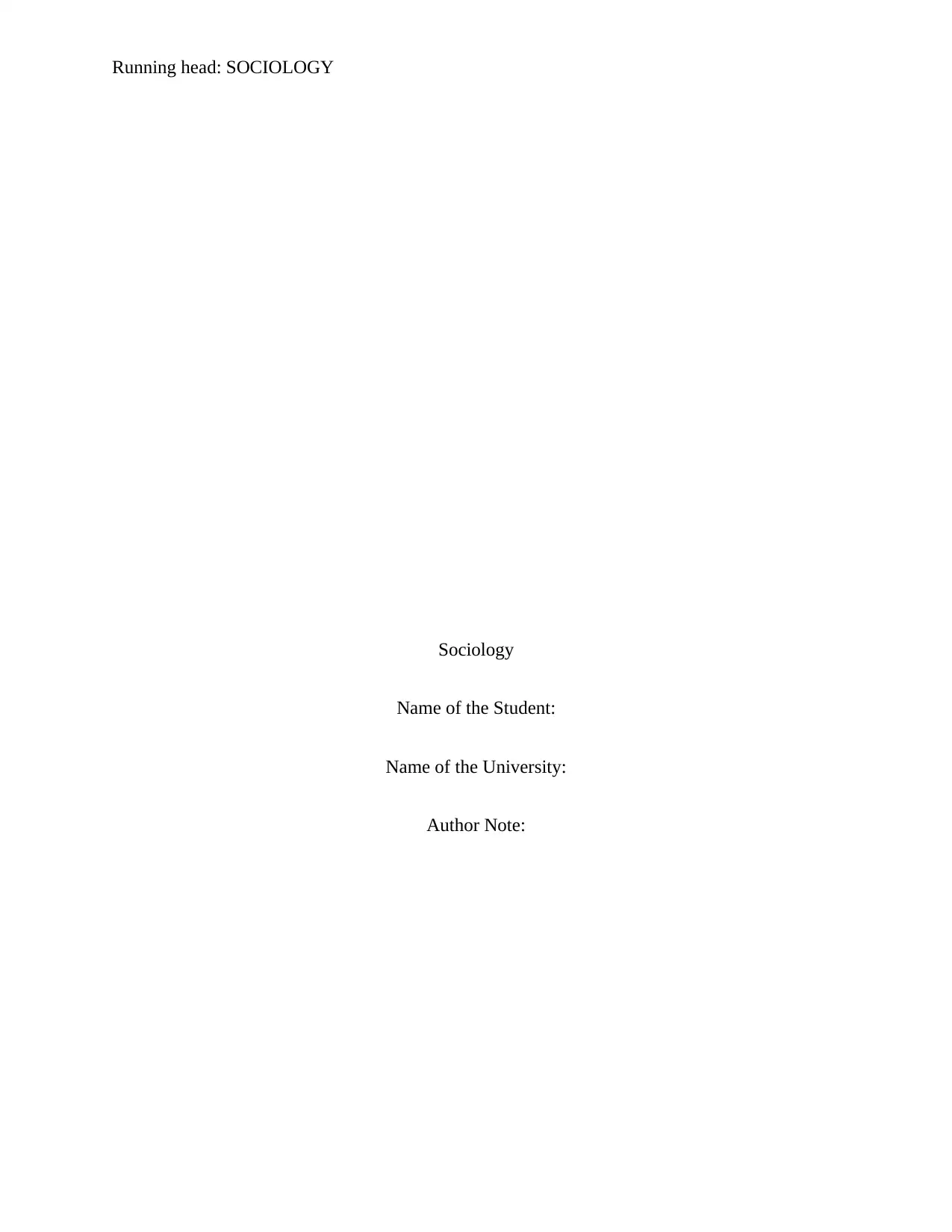
Running head: SOCIOLOGY
Sociology
Name of the Student:
Name of the University:
Author Note:
Sociology
Name of the Student:
Name of the University:
Author Note:
Paraphrase This Document
Need a fresh take? Get an instant paraphrase of this document with our AI Paraphraser
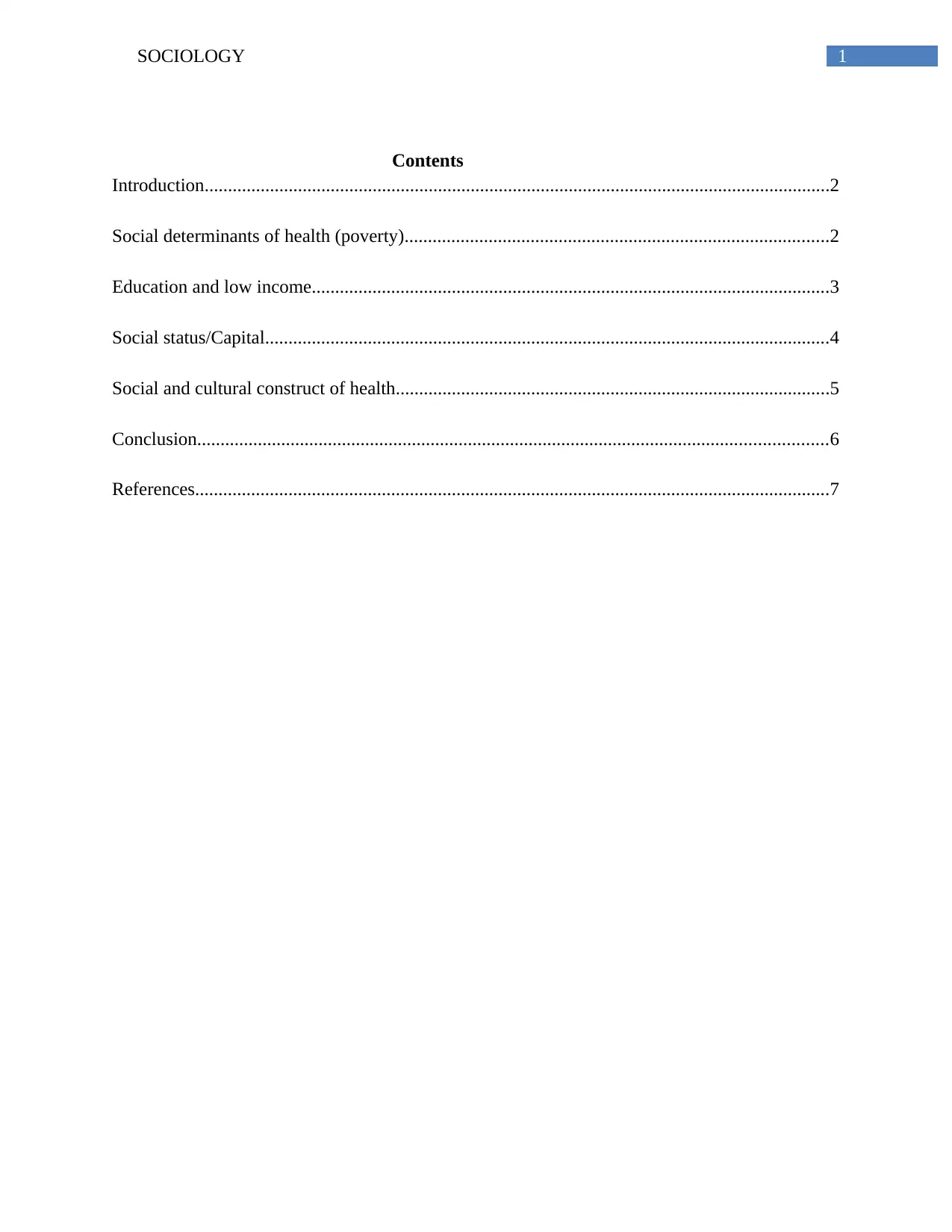
1SOCIOLOGY
Contents
Introduction......................................................................................................................................2
Social determinants of health (poverty)...........................................................................................2
Education and low income...............................................................................................................3
Social status/Capital.........................................................................................................................4
Social and cultural construct of health.............................................................................................5
Conclusion.......................................................................................................................................6
References........................................................................................................................................7
Contents
Introduction......................................................................................................................................2
Social determinants of health (poverty)...........................................................................................2
Education and low income...............................................................................................................3
Social status/Capital.........................................................................................................................4
Social and cultural construct of health.............................................................................................5
Conclusion.......................................................................................................................................6
References........................................................................................................................................7
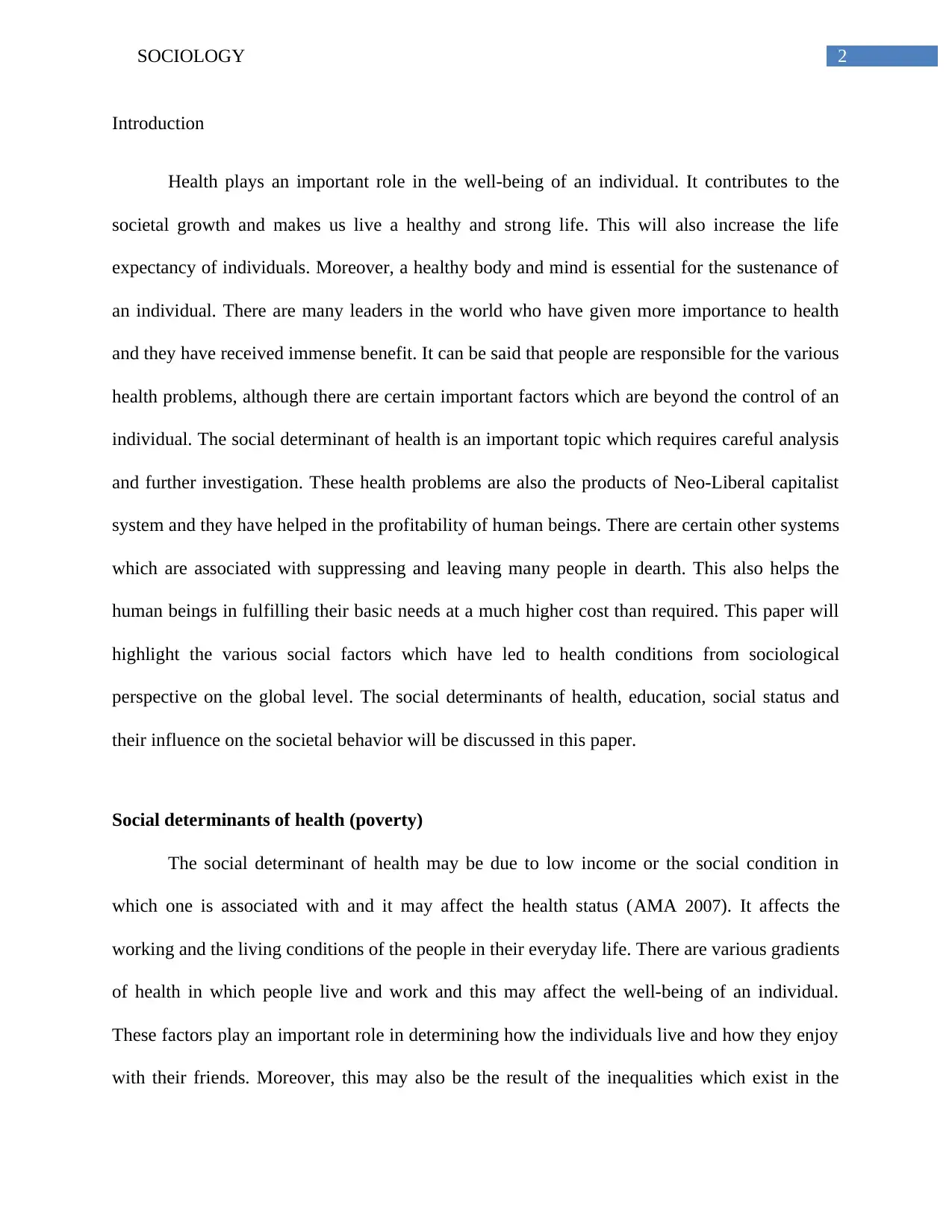
2SOCIOLOGY
Introduction
Health plays an important role in the well-being of an individual. It contributes to the
societal growth and makes us live a healthy and strong life. This will also increase the life
expectancy of individuals. Moreover, a healthy body and mind is essential for the sustenance of
an individual. There are many leaders in the world who have given more importance to health
and they have received immense benefit. It can be said that people are responsible for the various
health problems, although there are certain important factors which are beyond the control of an
individual. The social determinant of health is an important topic which requires careful analysis
and further investigation. These health problems are also the products of Neo-Liberal capitalist
system and they have helped in the profitability of human beings. There are certain other systems
which are associated with suppressing and leaving many people in dearth. This also helps the
human beings in fulfilling their basic needs at a much higher cost than required. This paper will
highlight the various social factors which have led to health conditions from sociological
perspective on the global level. The social determinants of health, education, social status and
their influence on the societal behavior will be discussed in this paper.
Social determinants of health (poverty)
The social determinant of health may be due to low income or the social condition in
which one is associated with and it may affect the health status (AMA 2007). It affects the
working and the living conditions of the people in their everyday life. There are various gradients
of health in which people live and work and this may affect the well-being of an individual.
These factors play an important role in determining how the individuals live and how they enjoy
with their friends. Moreover, this may also be the result of the inequalities which exist in the
Introduction
Health plays an important role in the well-being of an individual. It contributes to the
societal growth and makes us live a healthy and strong life. This will also increase the life
expectancy of individuals. Moreover, a healthy body and mind is essential for the sustenance of
an individual. There are many leaders in the world who have given more importance to health
and they have received immense benefit. It can be said that people are responsible for the various
health problems, although there are certain important factors which are beyond the control of an
individual. The social determinant of health is an important topic which requires careful analysis
and further investigation. These health problems are also the products of Neo-Liberal capitalist
system and they have helped in the profitability of human beings. There are certain other systems
which are associated with suppressing and leaving many people in dearth. This also helps the
human beings in fulfilling their basic needs at a much higher cost than required. This paper will
highlight the various social factors which have led to health conditions from sociological
perspective on the global level. The social determinants of health, education, social status and
their influence on the societal behavior will be discussed in this paper.
Social determinants of health (poverty)
The social determinant of health may be due to low income or the social condition in
which one is associated with and it may affect the health status (AMA 2007). It affects the
working and the living conditions of the people in their everyday life. There are various gradients
of health in which people live and work and this may affect the well-being of an individual.
These factors play an important role in determining how the individuals live and how they enjoy
with their friends. Moreover, this may also be the result of the inequalities which exist in the
⊘ This is a preview!⊘
Do you want full access?
Subscribe today to unlock all pages.

Trusted by 1+ million students worldwide
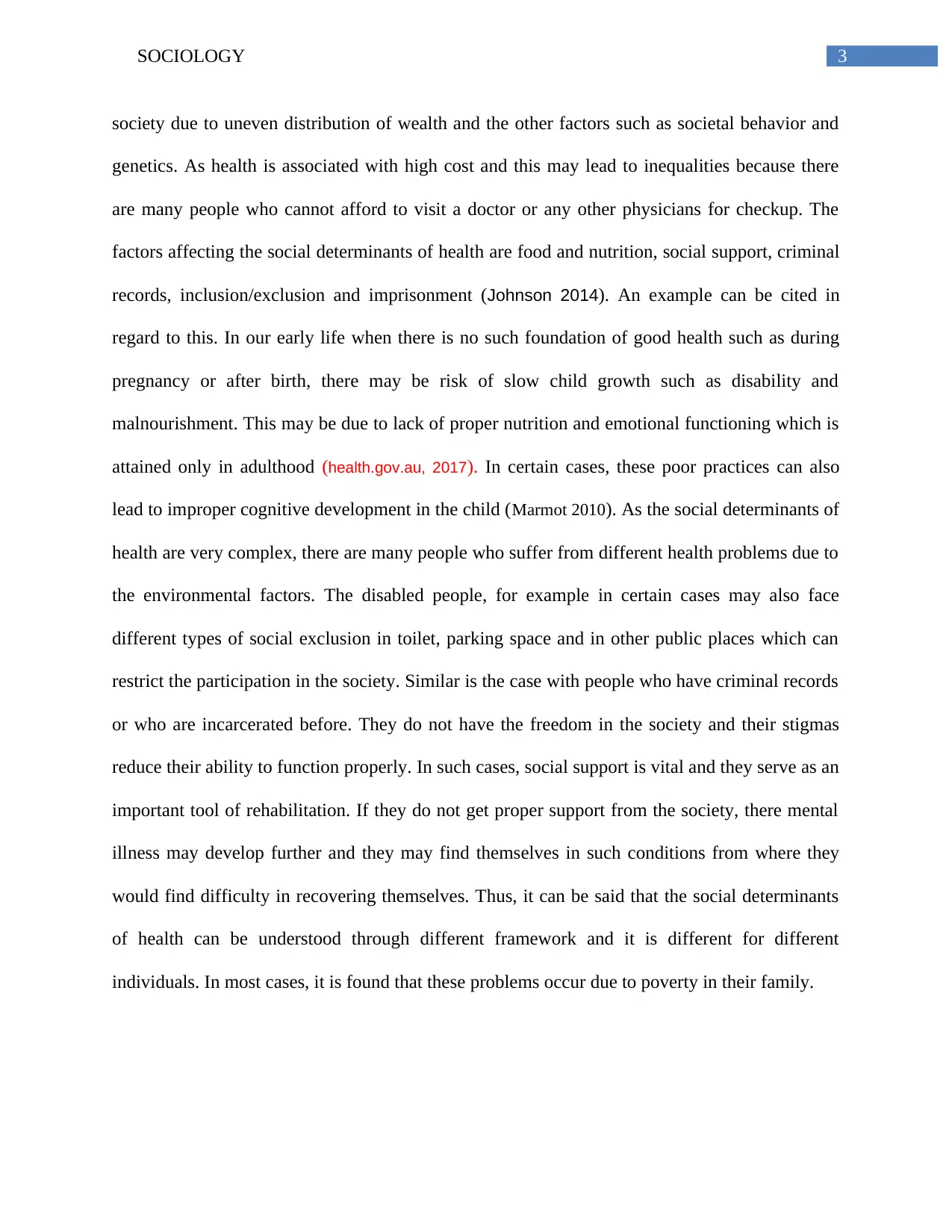
3SOCIOLOGY
society due to uneven distribution of wealth and the other factors such as societal behavior and
genetics. As health is associated with high cost and this may lead to inequalities because there
are many people who cannot afford to visit a doctor or any other physicians for checkup. The
factors affecting the social determinants of health are food and nutrition, social support, criminal
records, inclusion/exclusion and imprisonment (Johnson 2014). An example can be cited in
regard to this. In our early life when there is no such foundation of good health such as during
pregnancy or after birth, there may be risk of slow child growth such as disability and
malnourishment. This may be due to lack of proper nutrition and emotional functioning which is
attained only in adulthood (health.gov.au, 2017). In certain cases, these poor practices can also
lead to improper cognitive development in the child (Marmot 2010). As the social determinants of
health are very complex, there are many people who suffer from different health problems due to
the environmental factors. The disabled people, for example in certain cases may also face
different types of social exclusion in toilet, parking space and in other public places which can
restrict the participation in the society. Similar is the case with people who have criminal records
or who are incarcerated before. They do not have the freedom in the society and their stigmas
reduce their ability to function properly. In such cases, social support is vital and they serve as an
important tool of rehabilitation. If they do not get proper support from the society, there mental
illness may develop further and they may find themselves in such conditions from where they
would find difficulty in recovering themselves. Thus, it can be said that the social determinants
of health can be understood through different framework and it is different for different
individuals. In most cases, it is found that these problems occur due to poverty in their family.
society due to uneven distribution of wealth and the other factors such as societal behavior and
genetics. As health is associated with high cost and this may lead to inequalities because there
are many people who cannot afford to visit a doctor or any other physicians for checkup. The
factors affecting the social determinants of health are food and nutrition, social support, criminal
records, inclusion/exclusion and imprisonment (Johnson 2014). An example can be cited in
regard to this. In our early life when there is no such foundation of good health such as during
pregnancy or after birth, there may be risk of slow child growth such as disability and
malnourishment. This may be due to lack of proper nutrition and emotional functioning which is
attained only in adulthood (health.gov.au, 2017). In certain cases, these poor practices can also
lead to improper cognitive development in the child (Marmot 2010). As the social determinants of
health are very complex, there are many people who suffer from different health problems due to
the environmental factors. The disabled people, for example in certain cases may also face
different types of social exclusion in toilet, parking space and in other public places which can
restrict the participation in the society. Similar is the case with people who have criminal records
or who are incarcerated before. They do not have the freedom in the society and their stigmas
reduce their ability to function properly. In such cases, social support is vital and they serve as an
important tool of rehabilitation. If they do not get proper support from the society, there mental
illness may develop further and they may find themselves in such conditions from where they
would find difficulty in recovering themselves. Thus, it can be said that the social determinants
of health can be understood through different framework and it is different for different
individuals. In most cases, it is found that these problems occur due to poverty in their family.
Paraphrase This Document
Need a fresh take? Get an instant paraphrase of this document with our AI Paraphraser
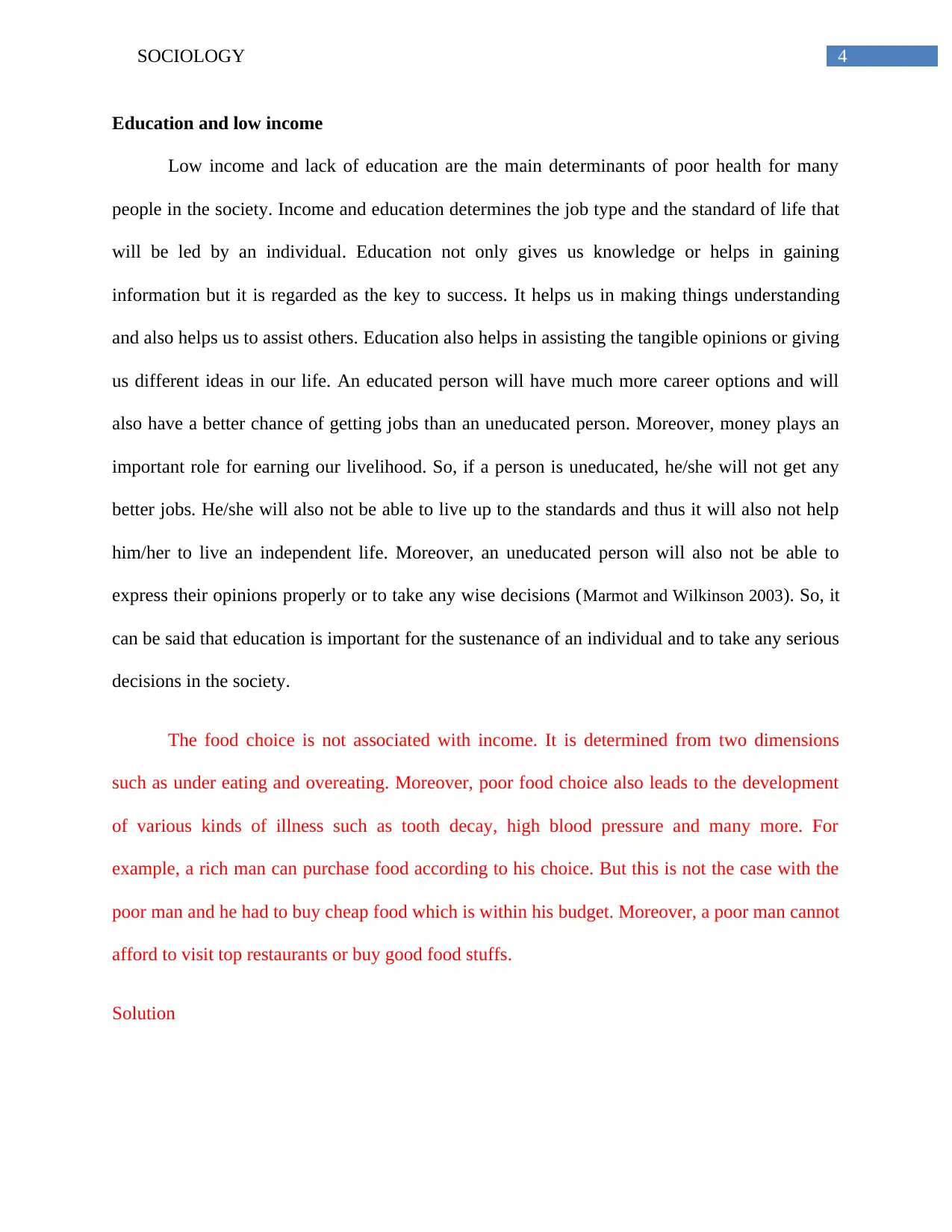
4SOCIOLOGY
Education and low income
Low income and lack of education are the main determinants of poor health for many
people in the society. Income and education determines the job type and the standard of life that
will be led by an individual. Education not only gives us knowledge or helps in gaining
information but it is regarded as the key to success. It helps us in making things understanding
and also helps us to assist others. Education also helps in assisting the tangible opinions or giving
us different ideas in our life. An educated person will have much more career options and will
also have a better chance of getting jobs than an uneducated person. Moreover, money plays an
important role for earning our livelihood. So, if a person is uneducated, he/she will not get any
better jobs. He/she will also not be able to live up to the standards and thus it will also not help
him/her to live an independent life. Moreover, an uneducated person will also not be able to
express their opinions properly or to take any wise decisions (Marmot and Wilkinson 2003). So, it
can be said that education is important for the sustenance of an individual and to take any serious
decisions in the society.
The food choice is not associated with income. It is determined from two dimensions
such as under eating and overeating. Moreover, poor food choice also leads to the development
of various kinds of illness such as tooth decay, high blood pressure and many more. For
example, a rich man can purchase food according to his choice. But this is not the case with the
poor man and he had to buy cheap food which is within his budget. Moreover, a poor man cannot
afford to visit top restaurants or buy good food stuffs.
Solution
Education and low income
Low income and lack of education are the main determinants of poor health for many
people in the society. Income and education determines the job type and the standard of life that
will be led by an individual. Education not only gives us knowledge or helps in gaining
information but it is regarded as the key to success. It helps us in making things understanding
and also helps us to assist others. Education also helps in assisting the tangible opinions or giving
us different ideas in our life. An educated person will have much more career options and will
also have a better chance of getting jobs than an uneducated person. Moreover, money plays an
important role for earning our livelihood. So, if a person is uneducated, he/she will not get any
better jobs. He/she will also not be able to live up to the standards and thus it will also not help
him/her to live an independent life. Moreover, an uneducated person will also not be able to
express their opinions properly or to take any wise decisions (Marmot and Wilkinson 2003). So, it
can be said that education is important for the sustenance of an individual and to take any serious
decisions in the society.
The food choice is not associated with income. It is determined from two dimensions
such as under eating and overeating. Moreover, poor food choice also leads to the development
of various kinds of illness such as tooth decay, high blood pressure and many more. For
example, a rich man can purchase food according to his choice. But this is not the case with the
poor man and he had to buy cheap food which is within his budget. Moreover, a poor man cannot
afford to visit top restaurants or buy good food stuffs.
Solution
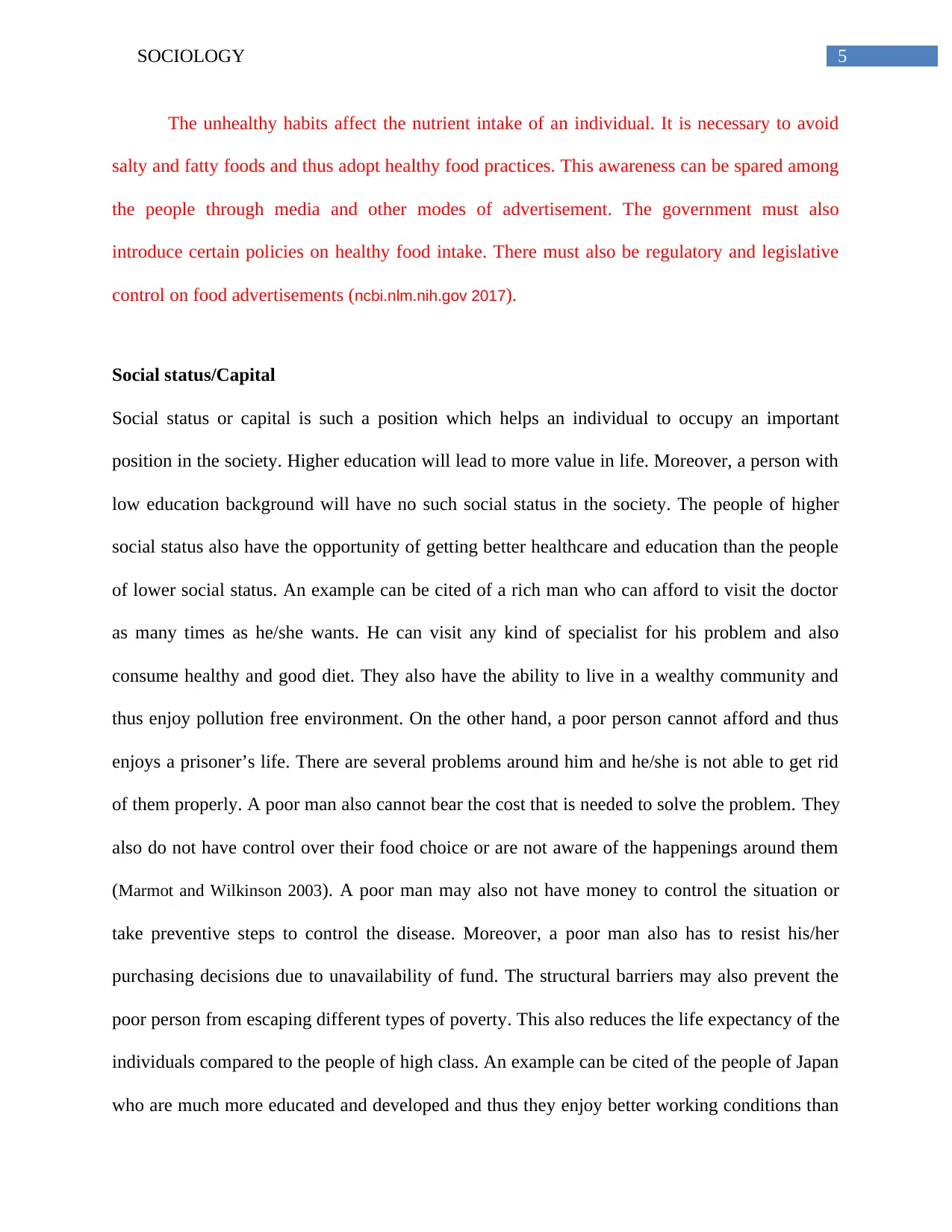
5SOCIOLOGY
The unhealthy habits affect the nutrient intake of an individual. It is necessary to avoid
salty and fatty foods and thus adopt healthy food practices. This awareness can be spared among
the people through media and other modes of advertisement. The government must also
introduce certain policies on healthy food intake. There must also be regulatory and legislative
control on food advertisements (ncbi.nlm.nih.gov 2017).
Social status/Capital
Social status or capital is such a position which helps an individual to occupy an important
position in the society. Higher education will lead to more value in life. Moreover, a person with
low education background will have no such social status in the society. The people of higher
social status also have the opportunity of getting better healthcare and education than the people
of lower social status. An example can be cited of a rich man who can afford to visit the doctor
as many times as he/she wants. He can visit any kind of specialist for his problem and also
consume healthy and good diet. They also have the ability to live in a wealthy community and
thus enjoy pollution free environment. On the other hand, a poor person cannot afford and thus
enjoys a prisoner’s life. There are several problems around him and he/she is not able to get rid
of them properly. A poor man also cannot bear the cost that is needed to solve the problem. They
also do not have control over their food choice or are not aware of the happenings around them
(Marmot and Wilkinson 2003). A poor man may also not have money to control the situation or
take preventive steps to control the disease. Moreover, a poor man also has to resist his/her
purchasing decisions due to unavailability of fund. The structural barriers may also prevent the
poor person from escaping different types of poverty. This also reduces the life expectancy of the
individuals compared to the people of high class. An example can be cited of the people of Japan
who are much more educated and developed and thus they enjoy better working conditions than
The unhealthy habits affect the nutrient intake of an individual. It is necessary to avoid
salty and fatty foods and thus adopt healthy food practices. This awareness can be spared among
the people through media and other modes of advertisement. The government must also
introduce certain policies on healthy food intake. There must also be regulatory and legislative
control on food advertisements (ncbi.nlm.nih.gov 2017).
Social status/Capital
Social status or capital is such a position which helps an individual to occupy an important
position in the society. Higher education will lead to more value in life. Moreover, a person with
low education background will have no such social status in the society. The people of higher
social status also have the opportunity of getting better healthcare and education than the people
of lower social status. An example can be cited of a rich man who can afford to visit the doctor
as many times as he/she wants. He can visit any kind of specialist for his problem and also
consume healthy and good diet. They also have the ability to live in a wealthy community and
thus enjoy pollution free environment. On the other hand, a poor person cannot afford and thus
enjoys a prisoner’s life. There are several problems around him and he/she is not able to get rid
of them properly. A poor man also cannot bear the cost that is needed to solve the problem. They
also do not have control over their food choice or are not aware of the happenings around them
(Marmot and Wilkinson 2003). A poor man may also not have money to control the situation or
take preventive steps to control the disease. Moreover, a poor man also has to resist his/her
purchasing decisions due to unavailability of fund. The structural barriers may also prevent the
poor person from escaping different types of poverty. This also reduces the life expectancy of the
individuals compared to the people of high class. An example can be cited of the people of Japan
who are much more educated and developed and thus they enjoy better working conditions than
⊘ This is a preview!⊘
Do you want full access?
Subscribe today to unlock all pages.

Trusted by 1+ million students worldwide
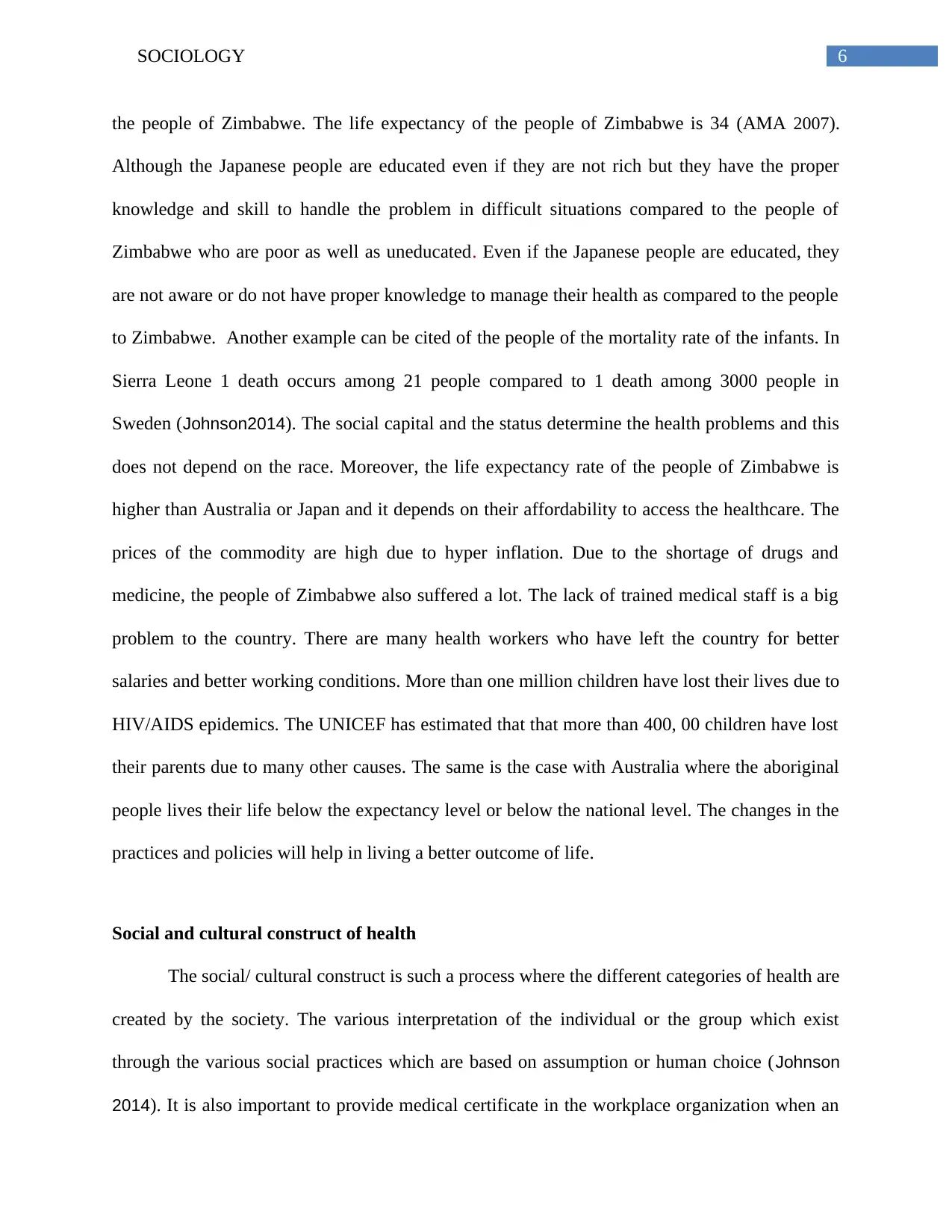
6SOCIOLOGY
the people of Zimbabwe. The life expectancy of the people of Zimbabwe is 34 (AMA 2007).
Although the Japanese people are educated even if they are not rich but they have the proper
knowledge and skill to handle the problem in difficult situations compared to the people of
Zimbabwe who are poor as well as uneducated. Even if the Japanese people are educated, they
are not aware or do not have proper knowledge to manage their health as compared to the people
to Zimbabwe. Another example can be cited of the people of the mortality rate of the infants. In
Sierra Leone 1 death occurs among 21 people compared to 1 death among 3000 people in
Sweden (Johnson2014). The social capital and the status determine the health problems and this
does not depend on the race. Moreover, the life expectancy rate of the people of Zimbabwe is
higher than Australia or Japan and it depends on their affordability to access the healthcare. The
prices of the commodity are high due to hyper inflation. Due to the shortage of drugs and
medicine, the people of Zimbabwe also suffered a lot. The lack of trained medical staff is a big
problem to the country. There are many health workers who have left the country for better
salaries and better working conditions. More than one million children have lost their lives due to
HIV/AIDS epidemics. The UNICEF has estimated that that more than 400, 00 children have lost
their parents due to many other causes. The same is the case with Australia where the aboriginal
people lives their life below the expectancy level or below the national level. The changes in the
practices and policies will help in living a better outcome of life.
Social and cultural construct of health
The social/ cultural construct is such a process where the different categories of health are
created by the society. The various interpretation of the individual or the group which exist
through the various social practices which are based on assumption or human choice (Johnson
2014). It is also important to provide medical certificate in the workplace organization when an
the people of Zimbabwe. The life expectancy of the people of Zimbabwe is 34 (AMA 2007).
Although the Japanese people are educated even if they are not rich but they have the proper
knowledge and skill to handle the problem in difficult situations compared to the people of
Zimbabwe who are poor as well as uneducated. Even if the Japanese people are educated, they
are not aware or do not have proper knowledge to manage their health as compared to the people
to Zimbabwe. Another example can be cited of the people of the mortality rate of the infants. In
Sierra Leone 1 death occurs among 21 people compared to 1 death among 3000 people in
Sweden (Johnson2014). The social capital and the status determine the health problems and this
does not depend on the race. Moreover, the life expectancy rate of the people of Zimbabwe is
higher than Australia or Japan and it depends on their affordability to access the healthcare. The
prices of the commodity are high due to hyper inflation. Due to the shortage of drugs and
medicine, the people of Zimbabwe also suffered a lot. The lack of trained medical staff is a big
problem to the country. There are many health workers who have left the country for better
salaries and better working conditions. More than one million children have lost their lives due to
HIV/AIDS epidemics. The UNICEF has estimated that that more than 400, 00 children have lost
their parents due to many other causes. The same is the case with Australia where the aboriginal
people lives their life below the expectancy level or below the national level. The changes in the
practices and policies will help in living a better outcome of life.
Social and cultural construct of health
The social/ cultural construct is such a process where the different categories of health are
created by the society. The various interpretation of the individual or the group which exist
through the various social practices which are based on assumption or human choice (Johnson
2014). It is also important to provide medical certificate in the workplace organization when an
Paraphrase This Document
Need a fresh take? Get an instant paraphrase of this document with our AI Paraphraser
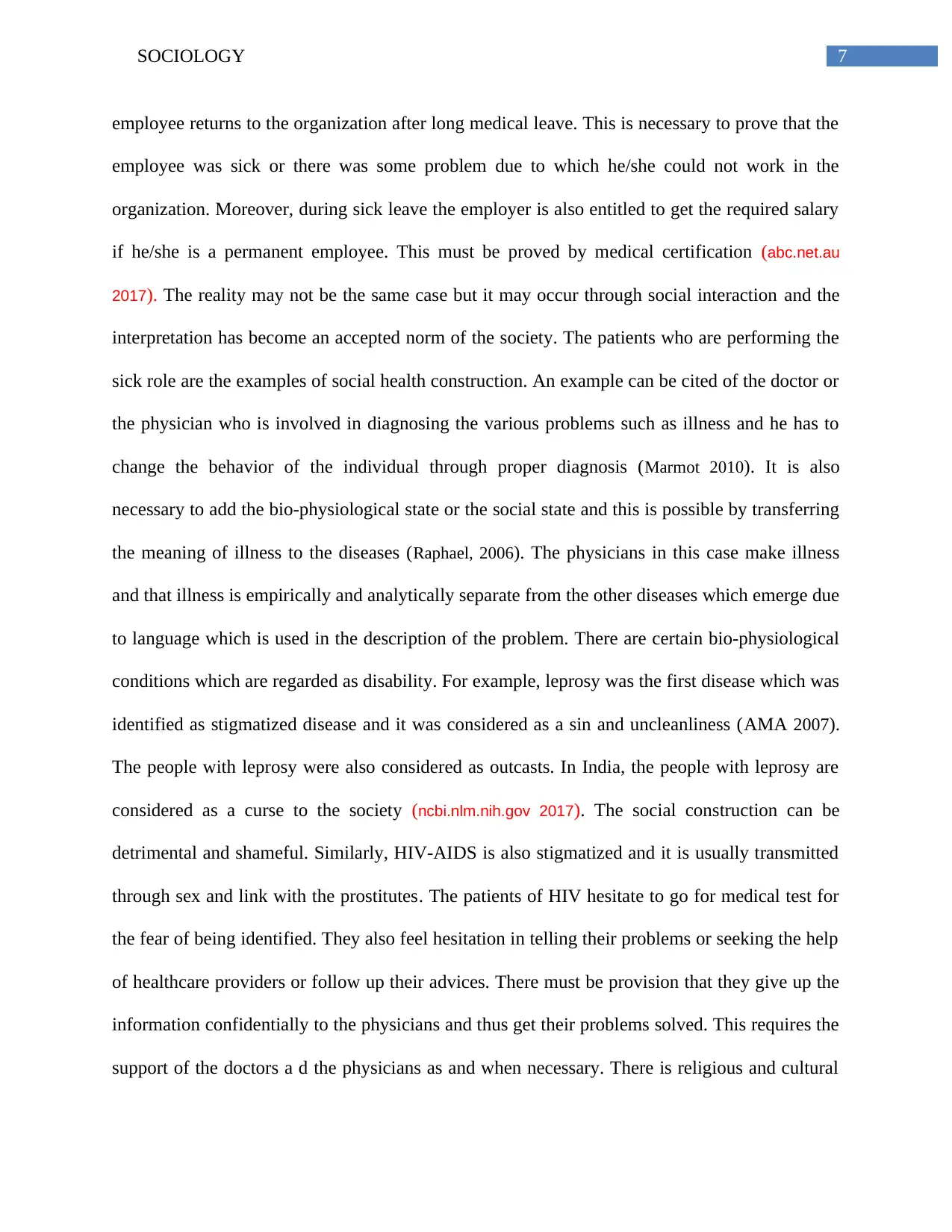
7SOCIOLOGY
employee returns to the organization after long medical leave. This is necessary to prove that the
employee was sick or there was some problem due to which he/she could not work in the
organization. Moreover, during sick leave the employer is also entitled to get the required salary
if he/she is a permanent employee. This must be proved by medical certification (abc.net.au
2017). The reality may not be the same case but it may occur through social interaction and the
interpretation has become an accepted norm of the society. The patients who are performing the
sick role are the examples of social health construction. An example can be cited of the doctor or
the physician who is involved in diagnosing the various problems such as illness and he has to
change the behavior of the individual through proper diagnosis (Marmot 2010). It is also
necessary to add the bio-physiological state or the social state and this is possible by transferring
the meaning of illness to the diseases (Raphael, 2006). The physicians in this case make illness
and that illness is empirically and analytically separate from the other diseases which emerge due
to language which is used in the description of the problem. There are certain bio-physiological
conditions which are regarded as disability. For example, leprosy was the first disease which was
identified as stigmatized disease and it was considered as a sin and uncleanliness (AMA 2007).
The people with leprosy were also considered as outcasts. In India, the people with leprosy are
considered as a curse to the society (ncbi.nlm.nih.gov 2017). The social construction can be
detrimental and shameful. Similarly, HIV-AIDS is also stigmatized and it is usually transmitted
through sex and link with the prostitutes. The patients of HIV hesitate to go for medical test for
the fear of being identified. They also feel hesitation in telling their problems or seeking the help
of healthcare providers or follow up their advices. There must be provision that they give up the
information confidentially to the physicians and thus get their problems solved. This requires the
support of the doctors a d the physicians as and when necessary. There is religious and cultural
employee returns to the organization after long medical leave. This is necessary to prove that the
employee was sick or there was some problem due to which he/she could not work in the
organization. Moreover, during sick leave the employer is also entitled to get the required salary
if he/she is a permanent employee. This must be proved by medical certification (abc.net.au
2017). The reality may not be the same case but it may occur through social interaction and the
interpretation has become an accepted norm of the society. The patients who are performing the
sick role are the examples of social health construction. An example can be cited of the doctor or
the physician who is involved in diagnosing the various problems such as illness and he has to
change the behavior of the individual through proper diagnosis (Marmot 2010). It is also
necessary to add the bio-physiological state or the social state and this is possible by transferring
the meaning of illness to the diseases (Raphael, 2006). The physicians in this case make illness
and that illness is empirically and analytically separate from the other diseases which emerge due
to language which is used in the description of the problem. There are certain bio-physiological
conditions which are regarded as disability. For example, leprosy was the first disease which was
identified as stigmatized disease and it was considered as a sin and uncleanliness (AMA 2007).
The people with leprosy were also considered as outcasts. In India, the people with leprosy are
considered as a curse to the society (ncbi.nlm.nih.gov 2017). The social construction can be
detrimental and shameful. Similarly, HIV-AIDS is also stigmatized and it is usually transmitted
through sex and link with the prostitutes. The patients of HIV hesitate to go for medical test for
the fear of being identified. They also feel hesitation in telling their problems or seeking the help
of healthcare providers or follow up their advices. There must be provision that they give up the
information confidentially to the physicians and thus get their problems solved. This requires the
support of the doctors a d the physicians as and when necessary. There is religious and cultural
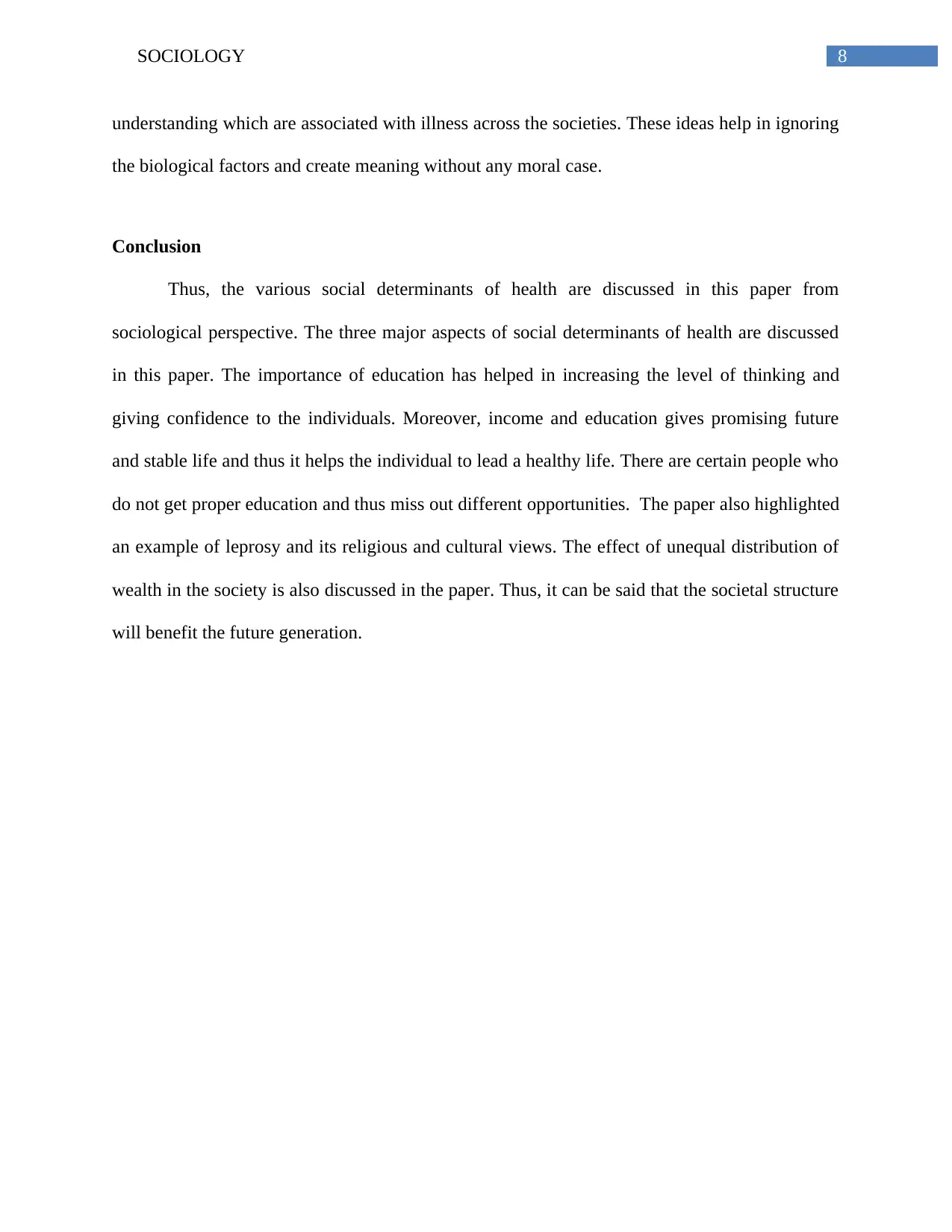
8SOCIOLOGY
understanding which are associated with illness across the societies. These ideas help in ignoring
the biological factors and create meaning without any moral case.
Conclusion
Thus, the various social determinants of health are discussed in this paper from
sociological perspective. The three major aspects of social determinants of health are discussed
in this paper. The importance of education has helped in increasing the level of thinking and
giving confidence to the individuals. Moreover, income and education gives promising future
and stable life and thus it helps the individual to lead a healthy life. There are certain people who
do not get proper education and thus miss out different opportunities. The paper also highlighted
an example of leprosy and its religious and cultural views. The effect of unequal distribution of
wealth in the society is also discussed in the paper. Thus, it can be said that the societal structure
will benefit the future generation.
understanding which are associated with illness across the societies. These ideas help in ignoring
the biological factors and create meaning without any moral case.
Conclusion
Thus, the various social determinants of health are discussed in this paper from
sociological perspective. The three major aspects of social determinants of health are discussed
in this paper. The importance of education has helped in increasing the level of thinking and
giving confidence to the individuals. Moreover, income and education gives promising future
and stable life and thus it helps the individual to lead a healthy life. There are certain people who
do not get proper education and thus miss out different opportunities. The paper also highlighted
an example of leprosy and its religious and cultural views. The effect of unequal distribution of
wealth in the society is also discussed in the paper. Thus, it can be said that the societal structure
will benefit the future generation.
⊘ This is a preview!⊘
Do you want full access?
Subscribe today to unlock all pages.

Trusted by 1+ million students worldwide
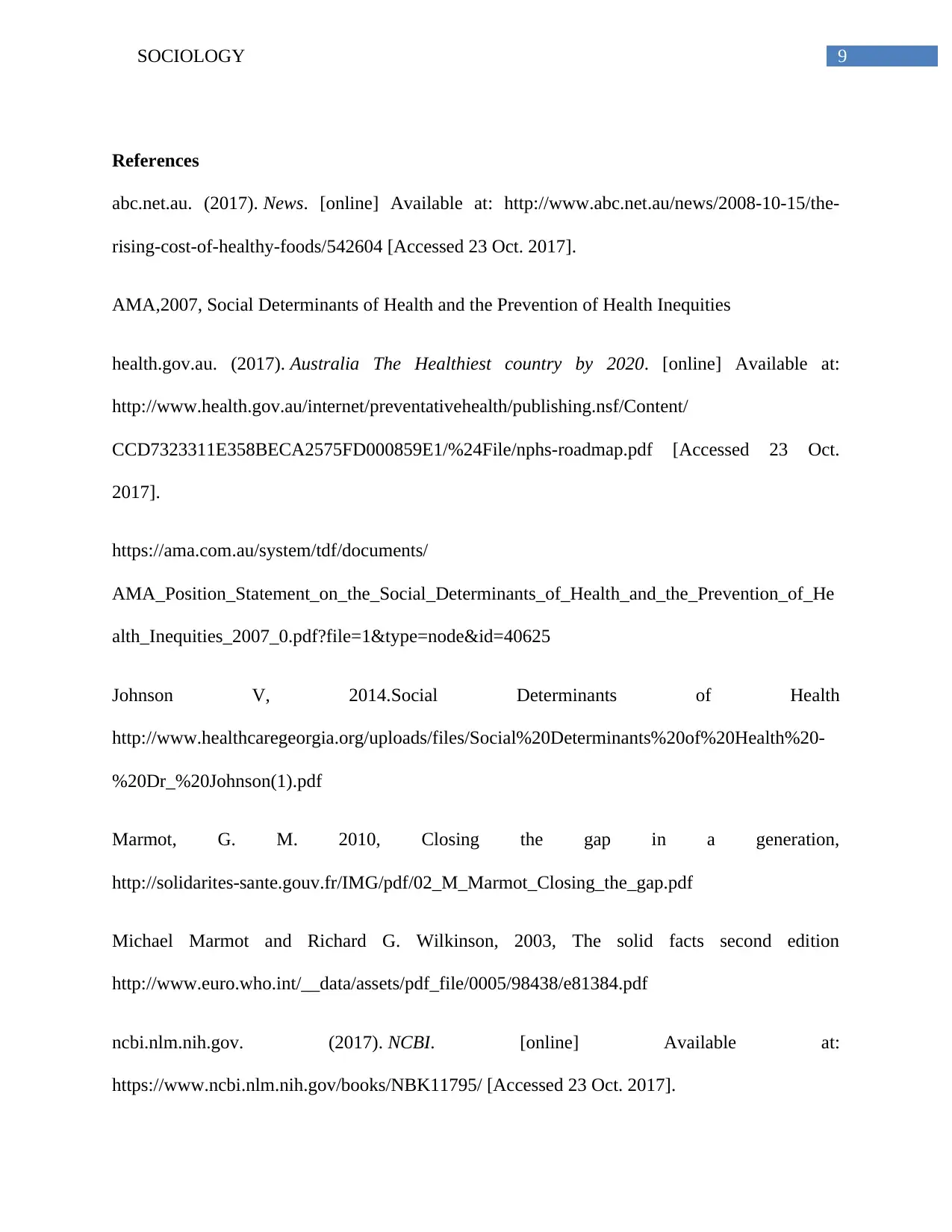
9SOCIOLOGY
References
abc.net.au. (2017). News. [online] Available at: http://www.abc.net.au/news/2008-10-15/the-
rising-cost-of-healthy-foods/542604 [Accessed 23 Oct. 2017].
AMA,2007, Social Determinants of Health and the Prevention of Health Inequities
health.gov.au. (2017). Australia The Healthiest country by 2020. [online] Available at:
http://www.health.gov.au/internet/preventativehealth/publishing.nsf/Content/
CCD7323311E358BECA2575FD000859E1/%24File/nphs-roadmap.pdf [Accessed 23 Oct.
2017].
https://ama.com.au/system/tdf/documents/
AMA_Position_Statement_on_the_Social_Determinants_of_Health_and_the_Prevention_of_He
alth_Inequities_2007_0.pdf?file=1&type=node&id=40625
Johnson V, 2014.Social Determinants of Health
http://www.healthcaregeorgia.org/uploads/files/Social%20Determinants%20of%20Health%20-
%20Dr_%20Johnson(1).pdf
Marmot, G. M. 2010, Closing the gap in a generation,
http://solidarites-sante.gouv.fr/IMG/pdf/02_M_Marmot_Closing_the_gap.pdf
Michael Marmot and Richard G. Wilkinson, 2003, The solid facts second edition
http://www.euro.who.int/__data/assets/pdf_file/0005/98438/e81384.pdf
ncbi.nlm.nih.gov. (2017). NCBI. [online] Available at:
https://www.ncbi.nlm.nih.gov/books/NBK11795/ [Accessed 23 Oct. 2017].
References
abc.net.au. (2017). News. [online] Available at: http://www.abc.net.au/news/2008-10-15/the-
rising-cost-of-healthy-foods/542604 [Accessed 23 Oct. 2017].
AMA,2007, Social Determinants of Health and the Prevention of Health Inequities
health.gov.au. (2017). Australia The Healthiest country by 2020. [online] Available at:
http://www.health.gov.au/internet/preventativehealth/publishing.nsf/Content/
CCD7323311E358BECA2575FD000859E1/%24File/nphs-roadmap.pdf [Accessed 23 Oct.
2017].
https://ama.com.au/system/tdf/documents/
AMA_Position_Statement_on_the_Social_Determinants_of_Health_and_the_Prevention_of_He
alth_Inequities_2007_0.pdf?file=1&type=node&id=40625
Johnson V, 2014.Social Determinants of Health
http://www.healthcaregeorgia.org/uploads/files/Social%20Determinants%20of%20Health%20-
%20Dr_%20Johnson(1).pdf
Marmot, G. M. 2010, Closing the gap in a generation,
http://solidarites-sante.gouv.fr/IMG/pdf/02_M_Marmot_Closing_the_gap.pdf
Michael Marmot and Richard G. Wilkinson, 2003, The solid facts second edition
http://www.euro.who.int/__data/assets/pdf_file/0005/98438/e81384.pdf
ncbi.nlm.nih.gov. (2017). NCBI. [online] Available at:
https://www.ncbi.nlm.nih.gov/books/NBK11795/ [Accessed 23 Oct. 2017].
Paraphrase This Document
Need a fresh take? Get an instant paraphrase of this document with our AI Paraphraser
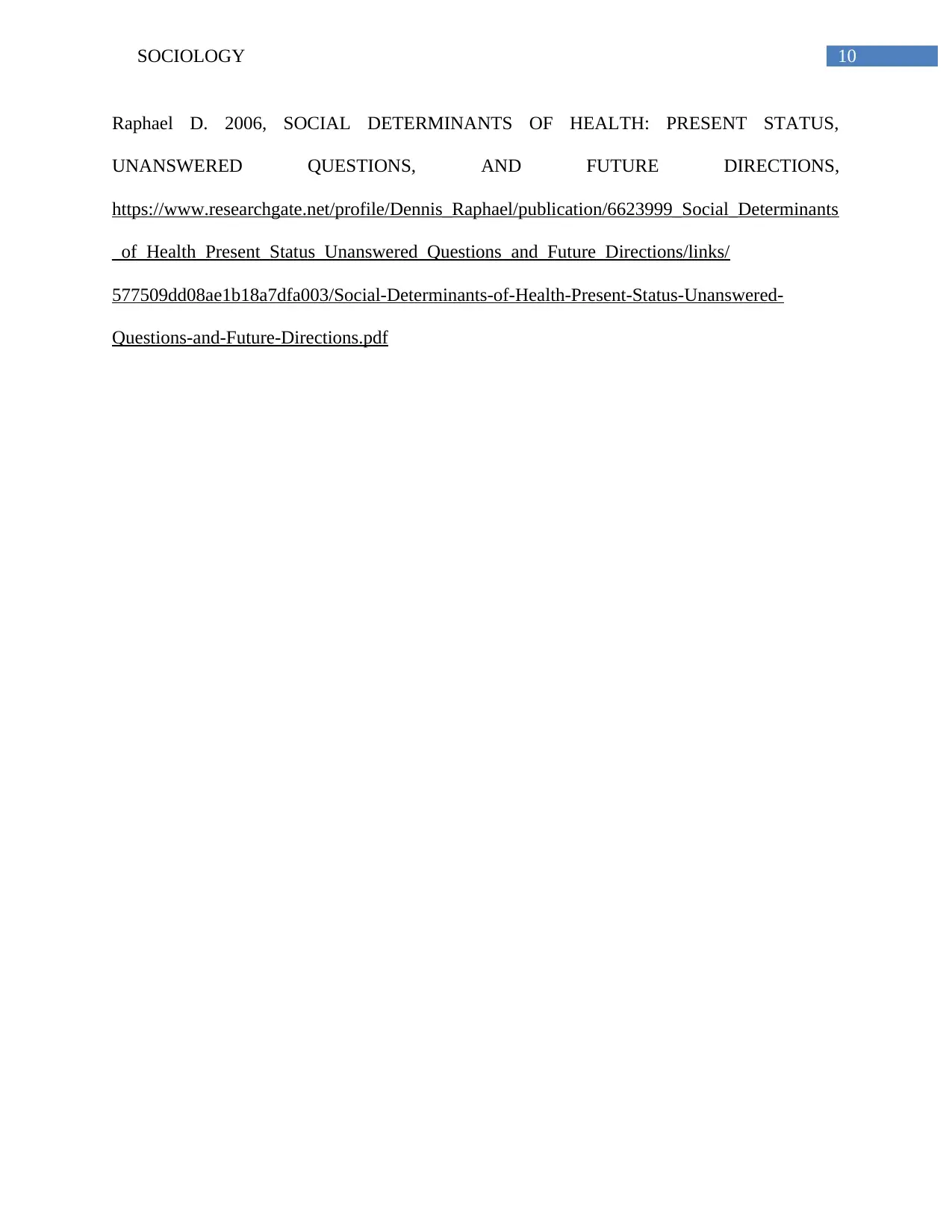
10SOCIOLOGY
Raphael D. 2006, SOCIAL DETERMINANTS OF HEALTH: PRESENT STATUS,
UNANSWERED QUESTIONS, AND FUTURE DIRECTIONS,
https://www.researchgate.net/profile/Dennis_Raphael/publication/6623999_Social_Determinants
_of_Health_Present_Status_Unanswered_Questions_and_Future_Directions/links/
577509dd08ae1b18a7dfa003/Social-Determinants-of-Health-Present-Status-Unanswered-
Questions-and-Future-Directions.pdf
Raphael D. 2006, SOCIAL DETERMINANTS OF HEALTH: PRESENT STATUS,
UNANSWERED QUESTIONS, AND FUTURE DIRECTIONS,
https://www.researchgate.net/profile/Dennis_Raphael/publication/6623999_Social_Determinants
_of_Health_Present_Status_Unanswered_Questions_and_Future_Directions/links/
577509dd08ae1b18a7dfa003/Social-Determinants-of-Health-Present-Status-Unanswered-
Questions-and-Future-Directions.pdf
1 out of 11
Related Documents
Your All-in-One AI-Powered Toolkit for Academic Success.
+13062052269
info@desklib.com
Available 24*7 on WhatsApp / Email
![[object Object]](/_next/static/media/star-bottom.7253800d.svg)
Unlock your academic potential
Copyright © 2020–2026 A2Z Services. All Rights Reserved. Developed and managed by ZUCOL.




